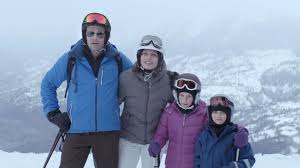A family sits down to enjoy a meal on the terrace of a ski resort. They seem happy and are enjoying lovely views of the mountain. There are some loud noises from the distance and snow comes tumbling down the mountain. Initially people want to take photos but start to panic when they realize that the avalanche is coming towards them. The father of the family Thomas (Johannes Kuhnke) seems to grab his phone and make a run for it leaving his wife Ebba (Lisa Loven Kongsli) to protect the children under the table. It turns out to be a controlled explosion with no real danger involved, and people go back to their tables laughing nervously, including Thomas. But with this initially seismic but essentially harmless event nothing will ever be the same again.”
This is the jumping off point for a film that is less about the visually spectacular forces of nature and more about the internal disaster than can build up in the wake of a seemingly benign but increasingly traumatic event. Early on in the film we see family members sitting around the hotel room on mobile devices seemingly oblivious to each other. That technology and alienation sit side by side is evident here, as Thomes only thinks about his phone when crisis ensues. In the early part of the film Thomas seems like an all-round good middle class dad, talking happily to his children. But after the avalanche his family seem to see him for the first time as he really is. Ebba relentlessly questions him about his actions which he initially denies. But once the scab is picked, the wound bleeds and what is left is a man seemingly bereft of traditional masculinity. He eventually moves towards a version of honesty and confession and hopefully absolution, but it feels contrived and we are left with the question of what we are like deep down when the pressure is on. Do we love ourselves more than we love our children?
A meal and drinks with another couple of friends is mined for some dark laughs with Thomas’ friend intent on getting him out of jail no matter how ludicrous and hollow he sounds. This other couple almost become a judge and jury on the relationship of Thomas and Ebba, roles they clearly do not relish. While this section of the film feels like relief from the familial terror in the earlier part of the film, it also robs the film of its power a little. But with the climax arrives a feeling that the worst part of the journey has not yet arrived.
Force Majeure is a riveting film with an icy heart. Fans of Michael Haneke will find much to love here. The cast are all excellent with Kristofer Hivju putting in a terrific cameo. The two children also give superb performances. The two leads are excellent, with both peeling back layers to reveal the rotting heart of their relationship. The avalanche that is the centrepiece of the film feels like the beginning of the end, but it is only after watching Ruben Östlund’s wonderfully dark film and the pieces start to come together you realise that the metaphorical snow was always barreling down the mountain.

